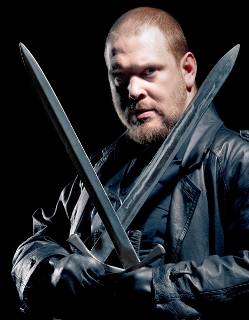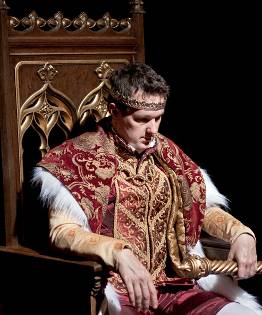Summary 
A talented ensemble in a well-directed and authentic indoor production of the tale of an ineffectual King. Pragmatic politics and a lack of honor, but a black-clad bastard anti-hero in a production that not only entertains - replete with 1960s songs by the Beatles, the Rolling Stones, and the Animals, plus some more modern rock-and-roll from Van Halen and Tom Petty - but expertly captures the irony and bitter humor of the play.
Design
Directed by Jim Warren. Costume design by Erin M. West. Fight direction by Colleen Kelly.
Cast
John Harrell (John), Tracy Hostmyer (Eleanor/Bigot), Tracie Thomason (Henry/ Blanche), Allison Glenzer (Constance/Melun), Ronald Peet (Arthur), Benjamin Curns (Philip Faulconbridge), Chris Johnston (Robert Faulconbridge/Pembroke/Duke of Austria), Abbi Hawk (Lady Faulconbridge/Salisbury), Rene Thornton, Jr. (Philip II), Grant Davis (Lewis), Gregory Jon Phelps (Chatillon/Cardinal Pandulph), James Keegan (Hubert).
Analysis
Jim Warren directs King John as well as two other Shakespeare productions within the American Shakespeare Center's five-play rotating repertory Fall 2012 season. An ensemble of twelve fill all the roles in all five shows, and they play musical instruments and sing pre-show as well, an acoustic version of The Beatles' "I'm Looking Through You" preceding an audience clap-along rendition of the theme from the 1970s television show The Jeffersons: "I'm Movin' on Up to the East Side." The modern songs reflect some of the themes of King John as well as Warren's emphasis on political irony - "your lips are moving, I cannot hear, your voice is soothing, but the words aren't clear" - and sly wit. Warren's cast truly shines as the production nears its beginning, alternating lead vocals to The Rolling Stone's (very) late-1960s "Gimme Shelter," belting out the apocalypse-themed anthem - "murder! rape! it's only a shout away!" - and concluding with a chilling echo of the final words - "love, children, it's just a kiss away" - in a big angry finish, the performers standing almost in challenge at the edge of downstage.

Warren begins the production - no set, few props, but colorful period robes - with John Harrell's pasty-complected John whining like a curly-haired child to his mother. Tracy Hostmyer's diminutive but hell-on-wheels Eleanor is a fiery Queen Mother - "ha!" - universally feared by the other characters, stomping around upstage in a yellow and green gown, a head-dress concealing her hair. The portrayals edge over the top, whimpering weak and harridan hard, but are balanced by Benjamin Curns's powerhouse Philip Faulconbridge, the über-confident Bastard of noble blood and intelligent bravado. He flirts with a young female audience member in one of the seats onstage - "now can I make any Joan a lady" - and derides his red-clad elder-brother rival as "Sir Knob." Wearing a long black leather coat and fingerless black gloves, Curns's Bastard takes overs the stage as well as John's court, a pillar of honor and courage as his mother raises a hand to strike him before revealing he is the son of the Lion-Hearted Richard and therefore the bastard nephew of King John. Bright-eyed and energetic, wearing short hair and a villainous goatee, the Bastard Philip derides the emissary from Austria, a much smaller man wearing a cloak made from a lion's pelt, the head of the lion at his shoulder.
During the 2.1 siege of Angiers in France, Curns's Bastard observes with pithy asides the political commodity and selfish gamesmanship on all sides, the mayor of Angiers in the balcony above listening like a deciding judge or a courted debutante, the French at stage left, King John and the English at stage right. Much to the actor's credit, Curns becomes an audience favorite just as his Bastard becomes the court enforcer, and he rolls his eyes, puts his tongue in his cheek, shakes his head, smirks, and leans against a railing during the negotiations: "I was never so bethumped with words since I called my brother's father, 'Dad.'" Warren infuses the scene with ironic humor, the English all groaning at Queen Eleanor joining the entourage, both sides glaring at each other from opposite sides of the stage, references to the Dauphin as "the Dolphin," and the petulant King John appealing on one knee like a spoiled child: "acknowledge the King and let me in!" But Curns dominates the scene with his laconic downstage commentary, gagging himself with his fingers as if to induce vomiting at the Dauphin's romantic words - "I never loved myself 'til now" - and taunting Austria 3.1 with a repeated refrain that becomes a single-combat challenge: "and hang a calf's skin on those recreant limbs." The Bastard's soliloquy condemning political commodity - "mad world, mad kings" - is an intimate appeal made directly to the audience, made more compelling through Curns's engaging humor, robust physicality, and booming voice.
Warren elicits strong supporting performances around Curns's noble Bastard. Allison Glenzer plays Constance with an on-the-edge-of-a-breakdown vulnerability, and Warren uses the 3.2 betrayal by King Phillip of France and Constance's histrionic 3.4 appeal as bookends for the Bastard's conquest of Austria. After the French King kneels to kiss the king of the Cardinal - who enters to the single tone from a tiny bell - the strutting Austria removes his lion head and pelt, gallantly gifting it to a woman in the audience, then taking it back for the confrontation with the Bastard. Curns's impolitic brute makes short work of him, knocking him down and dragging him bodily offstage, Austria flailing his arms and kicking his legs. The Bastard returns in a resolute march just a moment later with the pelt and the man's head in a bloody sack. Equally compelling is Glenzer's Constance prostrating herself 3.4 before the King, mascara down her cheeks, tearing the hair from her scalp, bemoaning the loss of her boy Arthur in the most emotional moment of Warren's production: "he talks to me that never had a son."

The relationship between trusted servant Hubert and soft-spoken rightful heir Arthur is pivotal to the play, the smarmy King trying to hint at the murder of his nephew with a bemused "Hubert! Hubert! Hubert!" during 3.3. John repulses with his self-satisfied taking of the throne - "here once again, we sit" - in 4.1, after the apparent murder. But James Keegan's honorable Hubert, his eyes already looking haunted, cannot go through with the murder, despite his menacing approach 4.1 with a glowing poker, aided by creepy black-hooded henchmen who bind Arthur to a chair. Keegan's Hubert can barely conceal his disgust and anger at the King 4.2, showing John the proof - "there is your hand and seal" - when the King tries to squirm away from any culpability. When a messenger announces Queen Eleanor has died - the messenger also played by Tracy Hostmyer in a clever inside joke - Harrell's John slumps and collapses in front of his throne. The already vivid performance - timidity and petulance - instantly becomes more complex, and Keegan's Hubert adds to the depth of the moment: "my lord, they say five moons were seen tonight."
Arthur's actual 4.3 demise seals King John's fate, and Warren executes the scene with a clever piece of stagecraft. Arthur lurks timidly in the balcony, seems to lose his balance, then disappears from sight with a wail. There is a loud thump onstage and the curtain billows as if with a nearby impact, and moments later the curtain is parted to reveal Arthur in a twisted heap upstage. Hubert recoils and drops his sword and dagger at the sight, and Curns's Bastard circles the stage and thunders in fury. A late intermission then returns the hardworking ensemble to their instruments and contemporary rock-and-roll songs, and after an Animals song from the 1960s, they play Tom Petty's "I Won't Back Down" - "you could stand me up at the gates of hell, but I won't back down" - before Curns leads them in a version of Van Halen's "Jump." The song is a head-scratcher - "you've got to roll with the punches to get to what's real" - perhaps included as a comment on Arthur's fall, and Curns with an acoustic guitar fronts a band that includes bass and violin along with an offstage drummer and a high-speed banjo solo that draws cheers from the audience.
Warren makes judicious cuts of Shakespeare's fifth act for this production, and he focuses on the crushed spirit of Harrell's King John. Gone now is the borderline comic portrayal of a childish monarch, Harrell's John silently surrendering his crown to the Cardinal and the church, then accepting its return by kneeling as "a gentle convertite." Despite the urgent admonitions of Curns's ever-noble Bastard - "be great in act as you have been in thought" and "glisten like the god of war" - Harrell's motherless King John is a crushed spirit taking the most expedient route. He returns 5.1 to trumpet fanfare but must use a cane to walk, and he steadies himself upon his throne. By 5.7 he has been lethally poisoned and is wheeled into a doorway wearing whitish robes (the image echoing the final return of a cleansed-in-spirit Lear), passing peacefully while Curns's Bastard implores him. The sadness of the conclusion, perhaps made moreso by the child-like nature of Harrell's John, is mitigated by the strength and honor inherent in the presence of Curns's Bastard and Keegan's Hubert (much as Lear's passing left not a void but a trio of strong personalities in Kent, Edgar, and Albany). Curns leads the ensemble to a thundering curtain call, a richly deserved ovation for an entertaining history told with a fresh and sardonic sense of humor.